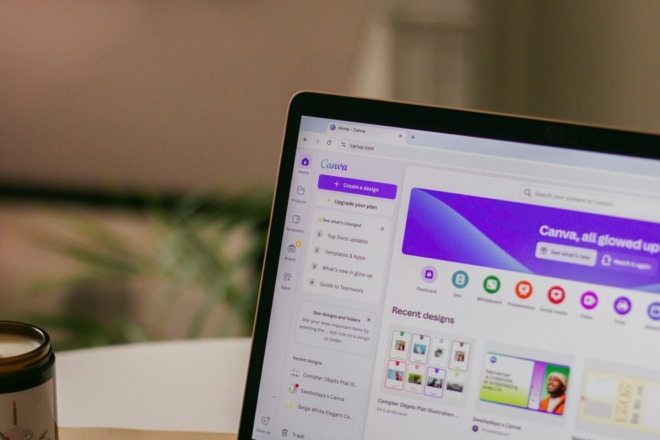Canva is a popular tool that many designers use to create graphics, charts, flyers and more. It is one of the many platforms that has made graphic design easy, especially for those less skilled in this area. It has also saved time with the thousands of templates it contains. Yet, the best part is many of its features are free.
However, Canva isn’t for everyone. Although the platform has basic design capabilities, designers may look for something more intuitive with more precise functionalities. Or, they may only want a tool that is simpler to use. This means you may be searching for a better alternative to Canva. The good news is plenty of other options are available that are comparable to this design tool.
1. Design Wizard
Design Wizard is a tool specifically made for graphic design, and you can use it directly online. It makes a great alternative to Canva because it’s easy to use. Simultaneously, it’s just as effective as Canva in creating stunning designs.
Design Wizard offers over one million images and thousands of videos, graphics, illustrations and more. You can also choose from various templates to help get you started. However, you also have the option to start from scratch to bring your creative ideas to life.
What’s awesome about Design Wizard is its focus on premium-quality images and videos. You can incorporate tons of free media to take your designs to the next level. Or, it’ll allow you to personalize your projects by uploading your own photos and logos.
Moreover, Design Wizard makes navigation easy for designers of all experience levels. Whether you’re a pro or a beginner, you can create designs effortlessly.
2. BeFunky
BeFunky is another excellent alternative to Canva. It’s an ideal platform for those who want a simple tool that’s versatile in features. BeFunky is a three-in-one platform offering a photo editor, collage maker and graphic designer. With these capabilities, you can handle all sorts of tasks, from adding effects to your photos to creating a simple social media post. This makes it convenient for those who need to work on everything in one place.
However, BeFunky’s strength lies in its photo editing. It comes with many filters and editing tools, making it simple to enhance your photos. It even has a skin retouch feature to make portraits look seamless.
While Canva’s interface may be more intuitive, some may like BeFunky’s UI more because of its simplicity. Yet, both platforms are closely similar when comparing their navigation. BeFunky also offers access to a large library of images and graphics.
However, many of them require you to upgrade to its paid version. Overall, BeFunky is a good option for those who want an all-in-one photo editing and graphic design solution.
3. Desygner
Desygner is a perfect graphic design tool for those who need one that offers more advanced features. Canva and Desygner are both similar in their range of design types. However, Desygner lets you upload custom logos. Additionally, they offer a wide selection of fonts for free, but you can upload your own fonts to stay on brand.
One of the best parts of Desygner is it lets you design on mobile and tablet devices. This compatibility makes it incredibly convenient for designing on the go. This means you can create or edit your designs anywhere, anytime, from your smartphone.
Desygner also offers a large number of templates, making it easy to start any project. Whether you’re working on social media or business presentations, you’ll find a template that fits your needs. The templates are also highly customizable, allowing you to add your personal touch.
Another great feature is its ability to import PDFs and edit them directly within the app. This is especially useful for business users who need to update documents without the hassle of converting file formats. If you use InDesign, you can even take those files and turn them into editable templates. Edit the text or switch the style — Desygner’s InDesign editor lets you customize in seconds.
4. Adobe Express
Adobe Express is one of Canva’s top competitors. One major difference is that it only offers a web and mobile version, whereas Canva lets you download its app on the desktop. Yet, the express version is for you if you value professional-grade design and Adobe’s other design programs. It works seamlessly with Adobe’s products, making it a huge plus for those who work around its ecosystem.
Adobe Express allows you to create high-quality designs. It offers various templates like Canva, including social media graphics, flyers and web pages. They are also highly customizable, allowing you to match the design to your needs.
Another feature designers like about Adobe Express is its interface. While both platforms offer a straightforward design experience, Adobe Express offers features like ‘quick actions.’ This allows one-click access to common design tasks, such as background removal, file formatting and image resizing.
Adobe Express also offers AI-driven design suggestions, which is helpful for streamlining the design process. One thing some users mention, though, is that the interface presents a cleaner look. It gives users more white space, making it slightly less clunky than Canva. Additionally, Adobe Express is less expensive than Canva, saving $5 more each month.
5. PicMonkey
PicMonkey makes another good alternative to Canva if you need a tool that combines photo editing and graphic design. In its earlier days, PicMonkey started as a photo editing tool for personal use. However, the platform has evolved into a solution for professional use.
PicMonkey is suitable for design and image editing. However, it’s more strong-suited for photos. Users can adjust exposure, color and clarity. You can even add filters and touch up portraits easily. Yet, PicMonkey still provides a considerable amount of design features. It has substantial templates that allow for ease of customization. You can also add your own text, images and branding elements.
The drag-and-drop interface makes your design process simple. Yet, it does have many more editing options than Canva, which may make it slightly overwhelming to first-time users.
Additionally, PicMonkey offers unlimited storage, while Canva Pro limits you to 100 GB. Therefore, PicMonkey users can save as much work as needed on its cloud and access it anytime from any device.
Overall, PicMonkey is an excellent choice for those who need photo editing and graphic design in one platform. While Canva offers more advanced design capabilities, PicMonkey is a good tool for all your basic needs.
Choosing a Better Alternative to Canva
Canva has grown widely in popularity and is always improving its features and functionality. However, if you’re looking for a different alternative to the platform, plenty of other suitable choices are available. Whether you are looking for something more advanced like Adobe Express or a simple image and graphic editor like PicMonkey, you have options. It all depends on your needs. Take advantage of each tool that catches your eye and explore their capabilities. Testing each platform will give you more insight into what works best for your projects.
About The Author
Eleanor Hecks is the Editor-in-Chief of Designerly Magazine, an online publication dedicated to providing in-depth content from the design and marketing industries. When she's not designing or writing code, you can find her exploring the outdoors with her husband and dog in their RV, burning calories at a local Zumba class, or curled up with a good book with her cats Gem and Cali.
You can find more of Eleanor's work at www.eleanorhecks.com.


